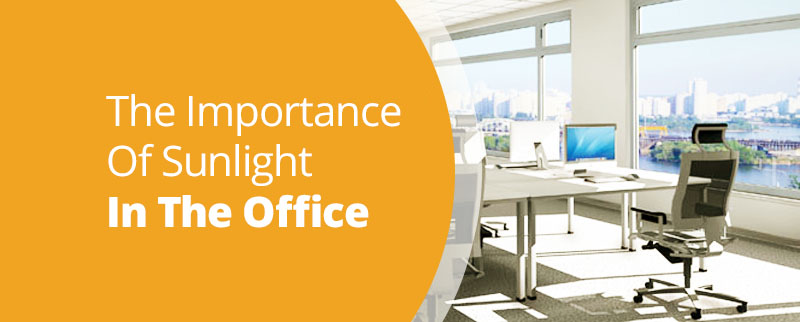
Importance of Daylight in the Office
Now that Spring is on its way, you should bring some daylight into the office.
What do the Scientists say?
According to researchers at Northwestern University in Chicago, having an office with plenty of windows and natural light might be good for your company in a surprising way.
I’m summarising, but compared to people working in dark offices, those in businesses with plenty of windows weren’t just exposed to more light (173% more according to the researchers), they tended to be more physically active, have a better quality of life and, crucially, sleep better.
In fact they slept an average of 46 minutes longer than employees that didn’t have natural light in the workplace. Imagine that – almost an extra hour in bed just for having windows in the office.
What’s more, researchers at Brigham and Women’s Hospital in Boston (the American one) found that the longer we’re awake, the slower we work.
Can you see where this is going? Staff in offices without natural light sleep more poorly, then work more slowly, then sleep more poorly… And so on. Think of it as a really, really slow version of the #WalkingDead – sooner or later, they’re going to end up as zombies.
Weirdly, the type of light you see during the day can also affect how drowsy you get towards the evening.
In a study from the Swiss Federal Institute of Technology in Lausanne, boffins asked young people to come and spend eight hours in their laboratory. The test subjects were either exposed to six hours of daylight (DL), or six hours of artificial light (AL).
When early evening set in, subjects that had been sitting in daylight ‘felt significantly more alert’, but people who’d been sitting under artificial light felt sleepier.
There’s another quirk to this story. At the end of the first day, both DL and AL groups had their cognitive performance measured.
What do you think happened? That’s right – they both did equally well. But on the second evening of tests, the DL subjects did much better than the AL.
So what does that mean? Well, if you’ve got a long day ending in an important meeting, make sure you stay next to a window. You’ll feel perkier when you have to do your presentation and, if you have to go again tomorrow, you should do better than your colleagues.
What can businesses do to ensure their staff are getting enough light?
Obviously we can’t command the sun to shine for longer.
One tip I’ve read is to try to make sure that desks are within 20 – 25 feet of windows. After that distance, the daylight drops off. You could also try placing mirrors around the office to make it brighter and, if your boss is really invested in the idea, you could add skylights to the roof.
But before you congratulate yourself on being forward thinking and using the sun to help empower your employees and business, the potential economic effects of daylight have been discussed for a long time.
As described in the book Saving the Daylight, in 1907 builder William Willet, from Chislehurst, published a pamphlet called ‘The Waste of Daylight’, in which he argued that the UK should take up ‘summer daylight saving time’.
Willet realised there’d be an enormous saving on energy trying to light up our homes; remember that back then there were multiple fuel types in use: electricity, gas, candles, oil lamps, etc.
He reckoned daylight saving time could save the economy about £2 million a year, which I believe is about £200 million today. And we can assume that Willet didn’t know about how daylight affects productivity.
When we think about Spring, we might imagine cherry blossoms blooming and dusters dusting – but isn’t the most important thing that we finally get our sunshine back?
We’ll sleep better and work faster.
Previously on The Euroffice Blog…
Euroffice SME News Roundup – March 2015
Turn Your Office into a Tardis


